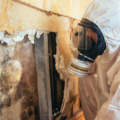
Mold growth is a common household issue in Singapore’s vibrant and humid city. It often goes unnoticed until it becomes a severe problem. While many people are aware of the physical health risks associated with mold exposure, such as allergies and respiratory issues, the impact on mental health is less understood. Recent studies have begun to reveal a surprising connection between mold exposure and various mental health problems, including anxiety, depression, and cognitive impairments. This blog post delves into the connection between muld and mental health, focusing on how mold affects mental well-being and what Singaporean residents can do to mitigate these effects.
Understanding Mold: A Brief Overview
Mold is a type of fungus that thrives in damp, humid environments. It reproduces by releasing tiny spores that can float through the air and settle on surfaces, where they grow into visible colonies. In Singapore’s tropical climate, mold can quickly become a pervasive issue in homes, particularly in areas with poor ventilation or where moisture is prevalent.
The Health Impacts of Mold
Mold is highly damaging to one’s physical health as it can cause various health issues, including but not limited to:
- Asthma: For example, infants who live in moldy homes are three times more likely to develop asthma by age 7.
- Allergies: Consistent exposure to mold can cause symptoms similar to those faced during allergies including watery eyes, runny nose, sneezing, and itching.
- Respiratory problems: As mold grows, it can release spores which become airborne and then inhaled. Inhaling these fragments can inflame the airways, causing cough and throat irritation, wheezing, and chest tightness.
- Infections: Certain types of mold, such as Aspergillus, can cause infections in the lungs and other organs, particularly in individuals with weakened immune systems.
The Mental Health Impact of Mold: What Research Shows
Scientific Studies and Findings
Several scientific studies support the link between mold exposure and mental health issues. A study published in the American Journal of Public Health found that individuals living in moldy homes were significantly more likely to experience depression. Another study in Environmental Health Perspectives reported that mold and dampness in homes were associated with higher anxiety and cognitive decline rates.
These studies suggest that mold exposure can profoundly impact mental health due to both direct and indirect effects. Direct effects may include the inhalation of mycotoxins, which are toxic compounds produced by mold. In contrast, indirect effects could be related to the stress and anxiety caused by living in a mold-infested environment.
Anxiety and Depression
One of the most concerning aspects of mold exposure is its potential to contribute to anxiety and depression. Mold spores can trigger immune responses that lead to inflammation in the body, which affects brain function and mood regulation. This biological response, combined with the stress of dealing with mold-related issues in the home, can exacerbate feelings of anxiety and depression.
Cognitive Impairments
Mold exposure has also been linked to cognitive impairments. Individuals living in moldy environments have reported symptoms such as memory problems, difficulty concentrating, and confusion. These cognitive issues can be particularly disruptive, affecting daily functioning and overall quality of life.
Research indicates that mycotoxins released by mold can have neurotoxic effects, potentially damaging the nervous system and impairing cognitive function. For residents of Singapore, where mold can be a constant presence, the risk of cognitive decline due to prolonged mold exposure is a significant concern.
Why Mold is a Particular Concern for Mental Health in Singapore
Climate Factors
Singapore’s tropical climate, characterised by high temperatures and humidity, creates an ideal environment for mold growth. The constant moisture in the air makes it difficult to keep homes completely dry, increasing the risk of mold infestation. This pervasive dampness can lead to continuous mold exposure, exacerbating its impact on mental health.
Urban Living Conditions
High-density living in urban areas contributes to mold problems. Many Singaporean homes are high-rise apartments with limited ventilation, which can trap moisture and create conditions conducive to mold growth. Additionally, the proximity of these living spaces means that mold spores can quickly spread from one unit to another, increasing the risk of widespread mold exposure.
Home Maintenance Challenges
In many Singaporean homes, maintenance issues such as poor ventilation, leaky pipes, and inadequate insulation can exacerbate mold problems. These issues are often not immediately apparent, allowing mold to spread undetected and increasing the potential for mental health impacts.
Identifying and Addressing Mold in Your Home
Signs of Mold Growth
Early mold identification is crucial for preventing its spread and mitigating its health effects. Common signs of mold growth include visible mold spots, musty odours, and health symptoms that worsen in certain home areas, such as respiratory issues and skin irritation.
Professional Mold Inspection and Remediation
When in doubt, contact a professional mold inspector for a comprehensive assessment. Professionals use advanced tools and techniques to detect mold, even in hidden areas, and provide detailed reports on mold levels and recommended remediation steps. Professional remediation is crucial for extensive mold infestations or when mold grows in hard-to-reach places.
The Psychological Effects of Living with Mold
Chronic Stress and Anxiety
In Singapore, where the high humidity and frequent rain create ideal conditions for mold growth, residents may find themselves constantly battling mold. The persistent presence of mold can develop a chronic stressor, leading to long-term anxiety and depressive symptoms. The visible presence of mold, the unpleasant odours, and the health symptoms it causes can create a persistent sense of unease. This chronic stress can lead to heightened anxiety levels, affecting overall mental well-being.
Impact on Children and Vulnerable Populations
Children and other vulnerable populations, such as the elderly and individuals with pre-existing mental health conditions, may be particularly susceptible to the mental health impacts of mold. Studies have shown that children exposed to mold are at higher risk of developing anxiety and depression, as well as cognitive impairments that can affect their academic performance and overall development.
Case Studies: Real-Life Impacts of Mold on Mental Health
Case Study 1: Young Family in Tampines
A young family in Tampines struggled with allergies and anxiety due to mold in their home. After implementing regular professional cleaning and maintenance, their symptoms improved, and the overall home environment became healthier. The family’s mental well-being improved and reported feeling more at ease in their home.
Case Study 2: Executive in Marina Bay
An executive living in a Marina Bay condominium used professional mold remediation services to address mold problems. The result was a noticeable improvement in mental clarity and reduced stress levels, which allowed for better work performance. The executive also reported better sleep quality and overall mood improvement.
Mitigating the Mental Health Impact of Mold
Preventive Measures
Preventing mold growth is essential for maintaining a healthy home environment and protecting mental health. Effective preventive measures include controlling indoor humidity levels, improving ventilation, and using mold-resistant products. Regular home maintenance, such as fixing leaks and cleaning areas prone to moisture, is also crucial.
Seeking Mental Health Support
If you suspect that mold exposure is affecting your mental health, it is important to seek help from a mental health professional. Therapies such as Cognitive Behavioral Therapy (CBT) can be effective for treating anxiety and depression related to mold exposure. Support groups can also provide a sense of community and shared experiences, helping individuals cope with the mental health impacts of mold.
Government and Community Initiatives
Government Guidelines and Support
The Singapore government provides guidelines and support for mold prevention and remediation. These include building regulations, public awareness campaigns, and financial assistance programs for home maintenance. Increased government support and stricter building codes could help reduce mold-related mental health issues in the population.
Community Awareness Programs
Local organizations run programs to raise awareness about mold and its health impacts. These programs offer educational resources, workshops, and community events to help residents manage mold issues effectively. Community awareness initiatives can empower residents to take proactive steps in preventing and addressing mold in their homes.
Why Professional Mold Clean-up is Vital for a Healthy Home in Singapore
Mold is a significant concern in Singaporean homes due to the unique climate and living conditions. Addressing mold problems is essential for both physical and mental health. Homeowners can take proactive steps to prevent and remediate mold issues by understanding the connection between mold and mental health. Regular home maintenance, professional cleaning services, and mental health support are crucial components of a holistic approach to maintaining a healthy living environment.
In summary, the impact of mold on mental health is a critical issue that requires greater attention. For residents of Singapore, addressing mold in the home is not just about maintaining appearances; it is about creating a healthier, more comfortable living space that supports both physical and mental well-being. Singaporeans can enjoy a healthier, mold-free home environment by combining proper home care with professional services and seeking mental health support when needed.
Are you ready to ensure a healthy and safe living environment? Don’t let mold compromise your home. Book a professional mold clean-up and removal service with experts today. Our team will thoroughly inspect and eliminate mold to keep your home clean and your family safe. Call us at 6241 9443 or send a WhatsApp message to +65 9222 9222 to schedule your service. Let Big Red help you create a mold-free, healthy living space!




